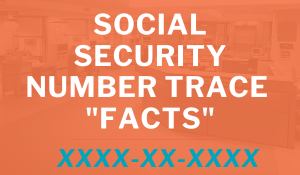The FACTS about the Social Security Number Trace and What is CHANGING.
What is the Social Security Number Trace?
A Social Security Number (SSN) Trace shows all names, including aliases and addresses associated with the entered social security number. The SSN Trace also can report the date of birth of the applicant as well as providing information on the date and state of issue.
What is the SSN Trace used for?
The SSN Trace is often run as an initial search in the background screening process to identify all names and addresses reported by the applicant. The names and counties of residence that are developed improve the scope and coverage of the background report. The SSN Trace fills in the gaps in terms of residential history that might be omitted or forgotten by the client during the disclosure process. The SSN Trace also can be used to verify the information provided by the applicant or as a tool for further research.
Where does the SSN Trace information come from?
SSN Trace data comes directly from the credit bureaus. The SSN Trace is the credit header data housed at the credit bureaus. The credit header data that is gathered can come from the following: utility companies, mortgage companies, credit inquiries, collection inquiries, postal records and other data gathered and collected by credit bureaus.
What does it mean if there is someone else’s name or address on an SSN Trace?
Different names or addresses may show up on an SSN Trace which means the applicant may have gotten married or just changed their name entirely. The most common reason for an unrelated name or address on the SSN Trace is due to data entry errors when entering SSN on any applications or documents. There is also a high frequency of cross reporting data when father and son have the same name.
What does it mean if the report shows “No Reportable Records Found”?
This could mean the applicant has very little or no address history or the individual may have recently been issued their social security number.
What is the Social Security Number Trace NOT used for?
The SSN Trace may NOT be used as the basis for adverse action. It is used to verify or correct information or as a tool for additional research. The SSN Trace does not signify someone’s eligibility to work in the US nor their immigration status.
SSN Randomization Act of 2011
What is SSN Randomization?
The Social Security Administration (SSA) changed the way Social Security Numbers (SSNs) are issued on June 25, 2011. This change is referred to as randomization. The SSA began assigning nine-digit SSNs in 1936 for the purpose of tracking worker earnings over the course of their lifetimes in order to pay benefits. The Randomization Act impacts the 'valid' portion of the Person Search, yielding some not valid designations.
For more information on the SSN Randomization Act of 2011 CLICK HERE
What's changing?
The Social Security Number (SSN) Trace is a great tool to develop identifiers (Full Names, Aliases, DOB & Address History). The information provided on the SSN Trace comes from CREDIT HEADER information, which is often filled with misspellings, cross reporting of information, and many other errors that can be misleading. In an effort to offer a more COMPLIANT screening report, the underlying information from the SSN Trace will no longer be provided. Our researchers will run the report and have visibility to the information in the results. This helps us to add county searches in states/counties where the applicant has resided and to add alias names where applicable.


